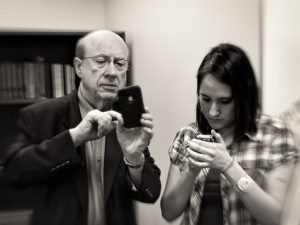
Understanding what it is like living with psychosis is very difficult. Staff and service users often struggle to talk openly and freely about symptoms. Therefore being able to develop a therapeutic relationship is key in mental health; however, it remains poorly taught and misunderstood across all health care professionals.
This study by McCabe et al (2016) aimed to see if psychiatrists’ communication skills and therapeutic relationship could be improved by focusing on developing a shared understanding.
Methods
The study was a cluster randomised controlled trial, with psychiatrists being randomised into two groups:
- The intervention was a manualised training course of four 3-hour sessions and one feedback session. The TEMPO manual (PDF) itself covers 150 pages
- The control group delivered care as usual.
Video data of consultations were collected at baseline and follow up (five months later).
The main outcomes focused on psychiatrists attempts to establish shared understanding (self-repair) and therapeutic relationship.
Results
- 25 out of 35 psychiatrists were randomised, however a further 4 were excluded
- There were 10 psychiatrists in the intervention group and 11 in the control
- 97 out of 407 eligible patients were recruited, 64 of which were followed up
- Psychiatrists in the intervention group used 44% more self-repair (95% CI 1.46 to 11.33, P<0.011)
- The therapeutic relationship was perceived more positively by psychiatrists (95% CI 0.03 to 0.37, P<0.022) and patients (95% CI 0.01 to 0.41, P<0.043) in the intervention arm
- Psychiatrist self-confidence in communicating with those who were psychotic increased after the training (t=5.19, 95% CI 1 to 2.04, P<0.01).

This trial found that a manualised training programme helped psychiatrists build more self-confidence in their communication.
Conclusion
The authors concluded:
This is the first study to test an intervention for psychiatrists to enhance communication with patients with psychosis. It suggests that shared understanding, which can be challenging in the treatment of psychosis, can be targeted in training and is important for improving the quality of the communication and the therapeutic relationship.
Discussion
This is a relatively small trial which focuses on improving the communication style and therapeutic relationships of psychiatrists through measuring self-repair. Whilst improving the therapeutic relationship is important, whether this brings about meaningful improvements and helps aid recovery is undoubtedly more important.
My first impression after reading this paper was surprise that improving the communication skills of psychiatrists had not been tried in this way before, indeed this was reported as the first trial of its kind for psychiatrists. For more than 30 years, there has been substantial training of health care practitioners to help them communicate therapeutically with people living with psychosis. Surely such fundamentals of good care should be a core part of training for all psychiatrists?
Readers wanting to find out more may like to explore the lessons learned from Thorn training and subsequent Cognitive Behavioural Therapy/Psychosocial Interventions for psychosis courses, which have been in existence for more than 20 years. Given the multidisciplinary nature of mental health work, more cross-discipline research in this area may yield benefits and avoid duplication of effort.
There are lots of useful resources out there to guide clinicians towards improve communication skills with someone who may be psychotic. I would recommend starting with this 2009 report called Talking with acutely psychotic people (PDF), by Len Bowers and colleagues.

Communication skills: surely a prerequisite for all professionals working with people with severe mental illness?
Links
Primary paper
McCabe R, John P, Dooley J, Healey P, Cushing A, Kingdon D, Bremner S, Priebe S. (2016) Training to enhance psychiatrist communication with patients with psychosis (TEMPO): cluster randomised controlled trial. The British Journal of Psychiatry Jul 2016, bjp.bp.115.179499; DOI: 10.1192/bjp.bp.115.179499
Other references
Bowers L, Brennan G, Winship G, Theodoridou C. (2009) Talking with acutely psychotic people. Communication skills for nurses and others spending time with people who are very mentally ill (PDF). City University, London.
Photo credits

It’s good to talk: training psychiatrists to improve communication with patients https://t.co/X9fZYfLTLy
Today @JohnBaker_Leeds on #TEMPO RCT. Training to enhance psychiatrist #communication with patients with #psychosis https://t.co/QXSZmS93Vl
.@Mental_Elf @JohnBaker_Leeds critical to have this evidence at a time when Continuing Prof. Development funding has been drastically cut
.@ian_hamilton_ @Mental_Elf medical education not been cut.
@JohnBaker_Leeds @Mental_Elf I was thinking more of CPD Thorn type training that psychiatrists could access & how this has been a casuality
So what happens when you train Psychiatrist to talk to people with psychosis? https://t.co/o9rdwm5661
@JohnBaker_Leeds @Mental_Elf used video feedback to train psychs for many years. Previous trial on basic psychotherapeutic skills in Mcr
@JohnBaker_Leeds @Mental_Elf but personally used video to teach junior doctors with IPs agree to be recorded for many years. Very rewarding
Great blog from @JohnBaker_Leeds training psychiatrists to improve communication with patients https://t.co/XkjCcOWntI via @sharethis
It’s good to talk training #psychiatrists to improve #communication with #patients https://t.co/JgxzDfDbmA @Mental_Elf on #RCT #evidence
Do we really need a trial of communication training for psychiatrists/should this not be key part of training? https://t.co/o9rdwm5661
@JohnBaker_Leeds @Mental_Elf do you mean it’s [communication] already working or must be added to the syllabus immediately?
@GrahamNewton12 @Mental_Elf should be fundamental part of the curriculum.
@JohnBaker_Leeds @Mental_Elf agreed! Can’t believe it’s not there already. Same for #pharmacists too. ?
@JohnBaker_Leeds @Mental_Elf Can’t quite believe I’m reading this!
@JohnBaker_Leeds @Mental_Elf In the day of bitesize rapid information processing… YES!
@JohnBaker_Leeds @Mental_Elf yes and yes!
RT @Mental_Elf: Don’t miss:
Training psychiatrists to improve communication with patients
@JohnBaker_Leeds on the #TEMPO RCT
https://t.co/Q…
RT @Mental_Elf: Communication skills
Surely a prerequisite for all professionals working with people with severe mental illness?
https://t.…
It’s good to talk: training #psychiatrists to improve #communication with patients https://t.co/G7LuJHqFiw #MentalHealth
RT @JohnBaker_Leeds: Today’s @Mental_Elf blog by me https://t.co/o9rdwm5661 teaching psychiatrists to talk to people with psychosis.
Οφέλη της #εκπαίδευσης #ψυχιάτρων στην ορθή θεραπευτική #επικοινωνία : μια βρετανική μελέτη & ένα manual
https://t.co/P3cu3XlNJ4
Οφέλη της #εκπαίδευσης #ψυχιάτρων στην ορθή θεραπευτική #επικοινωνία : μια βρετανική μελέτη & ένα manual… https://t.co/YKL9H1Oa3W
RT @EmadLilo: https://t.co/hAAv7H8kbP. Training #psychiatrists to communicate with #mentalhealth patients ! @asifamhp @NatashaSloman @Beres…
Great to see evidence that training can enable psychiatrists to support psychotic patients better during these sensitive and critical times
If the results were confirmed in a larger sample, maybe this specific model could be integrated into undergraduate training programs? Especially since the therapeutic alliance is one of the most important factors when treating psychosis.
It is shocking that the need for psychiatrists to have training in communication before this study has not been addressed. I think these findings could potentially be used on a wider scale and applied to all healthcare professionals to help improve the overall communication and therapeutic relationships with service users.
It’s surprising that teaching communication and forming therapeutic relationships, both fundamental to mental health practice, has not been more widely researched as it has such an influence on the service user experience of care. It would be interesting to see if these results would be confirmed by a larger sample.
Although I was initially shocked to find that this isn’t already a core theme in the training of psychiatrists, I think that this is a step in the right direction. I definitely agree that it would be beneficial to see this repeated with a wider sample of mental health professionals. In my mind a trusting and effective therapeutic relationship is integral in the long term care of someone suffering from psychosis (and every other mental health illness) and should therefore be nurtured.
It would have been interesting if all of the patients (407) had a follow up, instead of 64. It was good to note that after training psychiatrists’ self-confidence improved. There seems to be a valid need for more practical training and communication.
I think it highlights the need for healthcare professionals to be offered training to improve their ability to effectively communicate with acutely unwell people.
It’s great to be reminded of how the seemingly small things such as self-repair can have such a positive influence on therapeutic relationships and self-confidence in practitioners. Yet another piece of research which highlights the importance of continuous training in improving therapeutic relationships and therefore service user’s experiences .
I often find the most unpopular person on an acute ward is the psychiatrist, albeit they are harbinger of doom for many patients but I feel due to lack of contact with the patients in a more general setting on the ward rather in reviews etc that they miss the opportunity to build relationships with patients and this contributes to this. I feel that if in general greater therapeutic relationships were buit between patints and psychiatrists then their often difficult decisions to be made regarding patient care would be more well received. The study highlights that it is possible with intervention to greatly improve posychiatrist’s ability to form therapeutic bonds with patients and I think the effects would be far more reaching than in the reasons i’ve suggested here. Overall a great need and the coin should be flipped, speaking from a nursing point of view self evaluation and improvement is just as important and equally probably just as easy to go under the radar if personal development isn’t focused on continously through practice.
Don’t you just love it when you accidentally delete a comment? I don’t. I feel that on a psychiatric ward the pschiatrist always has the worst relationship with the patients. I attribute this mainly to them being the harbinger of doom leaving nurses at times as the messengers to be shot. Obviously they are in a tricky situation where they make the majority of the decisions which are usually against the patients wishes but i feel that if they did indeed have greater therapeutic relationships with clients then when bad news is delivered it would be better received. Speaking from an inpatient environment the patient and psychiatrist only ever seem to communicate in formal settings which i feel further prevents this thereapeutic relationship and that if it was infact increased the effects would be far more outreaching than the suggetsions I have briefly made. The study does however highlight the need for a flip of the coin and for all healthcare professionals to focus on continuing self improvement as it is easier than we all believe to slip into bad habits and routine.
found my comment
[…] on the The Mental Elf before, notably in two recent blogs by John Baker about related papers on communication with those with psychosis, and financial incentives for treatment […]